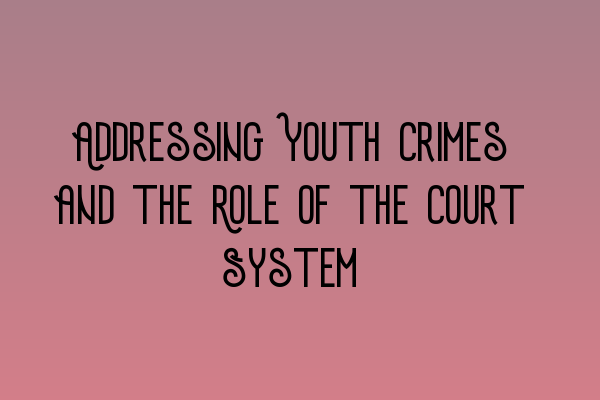Addressing Youth Crimes and the Role of the Court System
As solicitors specializing in criminal law, we often encounter cases involving youth crimes. It is concerning to see young individuals getting involved in illegal activities and finding themselves in front of a court. In this blog post, we will discuss the importance of addressing youth crimes and the crucial role that the court system plays in dealing with these cases.
Understanding Youth Crimes
Youth crimes refer to criminal offenses committed by individuals who are under the age of 18. These crimes can range from minor offenses like shoplifting or vandalism to more serious offenses such as drug trafficking or assault. It is essential to address these crimes promptly and effectively to prevent further delinquency and promote rehabilitation.
To effectively understand and address youth crimes, it is crucial to consider the multiple factors that contribute to such behavior. These factors may include socioeconomic background, peer influence, family dynamics, mental health issues, and educational opportunities. By considering these factors, the court system can better tailor interventions and rehabilitation programs for young offenders.
Role of the Court System
The court system plays a fundamental role in addressing youth crimes and ensuring appropriate consequences and rehabilitation measures are implemented. The primary goals of the court system in dealing with youth crimes are deterrence, accountability, and rehabilitation.
Deterrence: The court system aims to deter young individuals from engaging in criminal activities through the implementation of appropriate consequences. This may involve imposing fines, community service, probation, or even custody, depending on the severity of the offense. By experiencing the consequences of their actions, young offenders can understand the gravity of their behavior and the potential consequences they may face in the future.
Accountability: Holding young offenders accountable for their actions is essential for their personal growth and development. The court system ensures that they take responsibility for their behavior and understand the impact it has on others, society, and themselves. By holding them accountable, the court system aims to instill a sense of moral and ethical values that guide their future choices.
Rehabilitation: While punishment is necessary, the court system also recognizes the importance of rehabilitation. Instead of focusing solely on punitive measures, the system provides support and resources to help young offenders reintegrate into society. This may involve counseling, therapy, educational programs, vocational training, and mentorship. By addressing the underlying issues that may have contributed to their criminal behavior, the court system aims to promote positive change and reduce the likelihood of re-offending.
The Importance of Early Intervention
An essential aspect of addressing youth crimes is early intervention. Identifying and addressing behavioral issues at an early stage can make a significant difference in preventing further delinquency. By providing support and intervention programs, we can help steer young individuals away from a path of criminal behavior.
Early intervention programs can include mentoring, educational support, recreational activities, and community engagement. By redirecting their energies towards positive activities and providing them with positive role models, we can help young individuals make better choices and lead a constructive life.
It is crucial for society as a whole, including parents, educators, law enforcement, and legal professionals, to work collaboratively to identify at-risk individuals and provide them with the necessary support and guidance.
Conclusion
Addressing youth crimes requires a comprehensive approach that emphasizes deterrence, accountability, and rehabilitation. The court system plays a vital role in achieving these objectives by imposing appropriate consequences while also focusing on the rehabilitation and reintegration of young offenders. By implementing early intervention programs and providing support to at-risk individuals, we can effectively address youth crimes and promote a safer and more inclusive society.
For more information on the SQE (Solicitors Qualifying Examination), visit our related articles:
